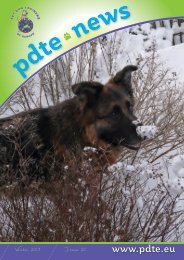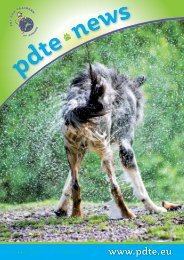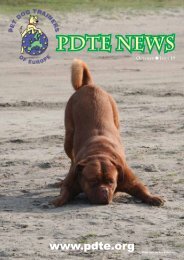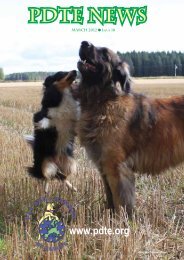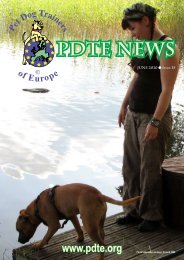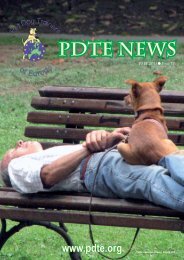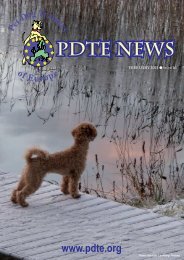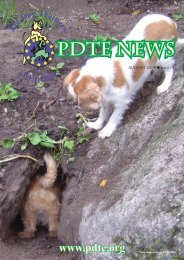PDTE Newsletter July 2020
You also want an ePaper? Increase the reach of your titles
YUMPU automatically turns print PDFs into web optimized ePapers that Google loves.
HOW OUR
MICROBIOTA
AFFECTS
OUR MENTAL
HEALTH
First of all, why do I talk about
our microbiota and not our dog’s
microbiota? Well, because it works
the same way for us, so while
thinking about our dog’s well
being, let’s also take the learning
for us!
For years now the knowledge about the
microbiome has shot up, we are now
very aware of the importance of having
beneficial bacteria in our gut. In previous
studies, it was established that Alterations
in the microbiota can modulate behaviours
such as social activity, stress, and
anxiety-related responses-that are linked to
diverse neuropsychiatric disorders.
A few months ago, a new study (Chu, C.
& al. The microbiota regulate neuronal
function and fear extinction learning.
Nature - October 2019) discovered the
mechanism by which the microbiota
(bacteria, fungi and parasites) allows
mice to forget their fear. In this study, to
get a sample of mice with fear, scientists
did settle fear in them first. Studies are
used to experiment on mice, rats etc.
but for the anecdote, studies to induce
learnt helplessness actually started in
1970 in dogs.
by Cristina Gomes Budzinski
Dog behaviorist in France and herbal choice selection practitioner
Is it better to hurt rats? Not really, it’s just
cultural, we tend to feel more empathy
for dogs than rats. So even though there
are ethics comities for studies protocol,
we just have to hope that empathy and
consideration for all kind of animals will
develop in the future.
So there were three groups of mice, a
control group, an antibiotic-treated mice
group and a germ-free mice group (born
and raised in a sterile environment).
While the fear of a noise started to
fade way progressively in the control
group, the mice with previous antibiotics
treatment and the germ free mice were
anxious, and still afraid of the noise.
When they restored their microbiota, the
mice managed to forget their fear.
The fear extinction mechanism relies a
lot in the activity of the medial prefrontal
cortex (known for the control of emo-
tions and the reasoning). Thanks to brain
imaging, they saw that mice with a ‘poor’
microbiota had lower cortical activity,
proof that their inability to forget fear
was due to a decrease in brain activity
and reshaping.
As scientists are figuring out the mechanism
that explains how our gut and our
brain communicate, we have to remember
that when we face an anxious dog.
Maybe his gut is unbalanced?
In herbal choice selection (zooopharmacognosy)
we often see anxious dogs
selecting plant material known to help
balance the gut, for example brewer
yeast. This is one more reason to let our
dogs self select what they need (zoopharmacognosy
is complementary to
allopathic medicine, it does not intend to
replace it).
We also have to think of offering our
dogs an appropriate and varied diet
including prebiotics (like fruits and
vegetables). Prebiotics are compounds in
food that induce the growth or activity of
beneficial bacterias.
In conclusion, whether it’s for our dog
or ourselves, we have to keep in mind
that the diet, and lifestyle influence the
brain’s health.
Interesting reading
In the Dog Symposium 2018, Elaine
Stavert did a whole talk about ‘Stress:
The effects of lifestyle on the brain, the
gut, and the brain-gut connection’ and
we have the chance to have the report
available on the website: www.dogsymposium.weebly.com/reports.html
This article of Jean Dodds also explains
things very clearly:
www.hemopet.org/gut-probiotics-pets/
July 2020
PDTE Newsletter
27









